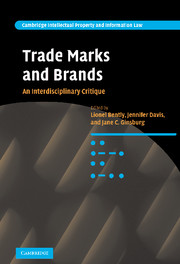Book contents
- Frontmatter
- Contents
- List of figures and tables
- Notes on the contributors
- Editors' preface
- Table of cases
- Table of statutes
- Part I Legal and economic history
- Part II Current positive law in the EU and the USA
- Part III Linguistics
- Part IV Marketing
- Part V Sociology
- Part VI Law and Economics
- Part VII Philosophy
- 13 Trade marks as property: a philosophical perspective
- 14 An alternative approach to dilution protection: a response to Scott, Oliver and Ley-Pineda
- Part VIII Anthropology
- Part IX Geography
- Bibliography
- Index
- Titles in the series
13 - Trade marks as property: a philosophical perspective
Published online by Cambridge University Press: 13 April 2010
- Frontmatter
- Contents
- List of figures and tables
- Notes on the contributors
- Editors' preface
- Table of cases
- Table of statutes
- Part I Legal and economic history
- Part II Current positive law in the EU and the USA
- Part III Linguistics
- Part IV Marketing
- Part V Sociology
- Part VI Law and Economics
- Part VII Philosophy
- 13 Trade marks as property: a philosophical perspective
- 14 An alternative approach to dilution protection: a response to Scott, Oliver and Ley-Pineda
- Part VIII Anthropology
- Part IX Geography
- Bibliography
- Index
- Titles in the series
Summary
In this chapter, we investigate the idea of trade marks as property. Three questions need to be answered. The first is a conceptual matter: are trade marks capable of being property or are they ruled out as a matter of conceptual necessity? The second is conceptual-cum-descriptive: is the current law's treatment of trade marks treatment of them as property? The third is normative: if the current law does in fact treat them as property, is it right to do so? The questions need to be tackled in turn.
Are trade marks capable of being property?
When we ask whether trade marks are capable of being property, we are of course assuming that it makes sense to speak of things (resources, assets) being property. In other words, we assume with the layman and the practising lawyer that it makes sense to speak of an owner of a thing, where the thing owned is the property. Admittedly, among legal theorists there is a long tradition going back to Bentham that ridicules this way of speaking. It insists that property is best characterized not as the thing itself but as a bundle of normative relationships between people concerning the use of the thing. But, as Harris has rightly argued, this is a false opposition. In particular, scepticism about the very idea of ownership of a thing is generally based on the thesis that ownership involves the right to use a thing in any way one pleases.
- Type
- Chapter
- Information
- Trade Marks and BrandsAn Interdisciplinary Critique, pp. 285 - 305Publisher: Cambridge University PressPrint publication year: 2008
- 2
- Cited by



